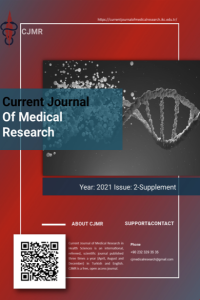ÜNİVERSİTE ÖĞRENCİLERİNİN CİNSEL YOLLA BULAŞAN HASTALIKLAR KONUSUNDA BİLGİ DÜZEYİ, TUTUM VE DAVRANIŞLARININ DEĞERLENDİRİLMESİ
Abstract
Amaç: Üniversite öğrencilerinin cinsel yolla bulaşan hastalıklar (CYBH) hakkındaki bilgi düzeyleri, tutum ve davranışlarının değerlendirilmesi amaçlanmıştır.
Materyal ve Metot: Kesitsel araştırma tasarımına sahip çalışmamız, anket çalışması olarak planlandı. Toplam 170 üniversite öğrencisi çalışmaya katıldı. Bilgi düzeyini ölçen sorular, doğru cevap yüzdelerine göre puanlandı. En yüksek puan %100, en düşük puan %0 olarak belirlendi. Kuder Richardson-21 güvenilirlik katsayısı .89 ve Cronbach alfa güvenilirlik katsayısı .91 olarak bulundu. Tanımlayıcı analiz olarak sayı, yüzde, ortalama ve standart sapma kullanıldı. Gruplar arası değişkenler ve grup dağılımları hesaplandıktan sonra Mann Whitney U testi, Student’s T test uygulandı. p<0,05 olan değerler istatiksel olarak anlamlı kabul edildi.
Bulgular: Klamidya, HBV, HPV, genel bilgi ile ilgili sorularda ortalama skor sırasıyla; %30,1; %35,2; %38,1; %54,8 olarak bulundu. Sağlık bilimlerinde okuyanlar (p<0,001), üniversitede bulunma süresi dört yıl veya üstü olanlar (p:0,002) ve daha önce cinsel sağlık eğitimi alanların (p<0.001) ve yeterince tedbir aldığını düşünenlerin (p<0,001) ortalama bilgi skorları yüksek saptandı. Sağlık bilimlerinde okuyanlar ve daha önce cinsel sağlık eğitimi alanlar CYBH’a karşı yeterince tedbir aldıkları-nı (p<0,001,p:0,008) ve hastalık varlığında yapılması gerekenleri bildiklerini (p:0,008,p<0,001) belirtmişlerdir. Sağlık bilimlerinde okuyanlar tek eşliliğin CYBH’a karşı etkili olduğunu belirtmişlerdir (p:0,021). Ayrıca erkek katılımcılar CYBH varlığında bu durumu çevreleri ile rahatlıkla paylaşabileceklerini belirtmişlerdir (p:0,014).
Sonuç: Üniversite öğrencileri arasında, CYBH’a bilgi düzeylerinin yetersiz olduğu sonucuna varılmıştır.
Keywords
EVALUATION OF UNIVERSITY STUDENTS' KNOWLEDGE LEVELS, ATTITUDES AND BEHAVIORS ABOUT CHLAMYDIA, HBV AND HPV
Abstract
Purpose: Sexually transmitted diseases (STDs) continue to increase as one of the major health problems for adolescents and young adults worldwide. This study aimed to measure the level of knowledge, prevention, precautions and awareness of university students about sexually transmitted diseases.
Material and Methods: Our study, which has a cross-sectional research design, was planned as a survey study. A total of 170 university students participated in the study. Questions measuring the level of knowledge were scored according to the percentage of correct answers. The highest score was determined as 100% and the lowest score as 0%. Kuder Richardson-21 reliability coefficient was .89 and Cronbach alpha reliability coefficient was found as .91. Number, percentage, mean and standard deviation were used as descriptive analysis. After calculating the intergroup variables and group distributions, the Mann Whitney U test and the Student's T-test were applied. Values with p<0.05 were considered statistically significant.
Results: In the questions about Chlamydia, HBV, HPV, general knowledge, the mean score was respectively; 30.1%; 35.2%; 38.1%; It was found to be 54.8%. The mean knowledge scores of those who studied health sciences (p<0.001), those who had been at the university for four years or more (p:0.002), and those who had previously received sexual health education (p<0.001) and thought that they had taken adequate precautions (p<0.001) were found to be high. Those studying in health sciences and those who had previously received sexual health education stated that they took adequate precautions against STD (p<0.001, p:0.008) and that they knew what to do in the presence of a disease (p:0.008, p<0.001). Those studying in health sciences stated that monogamy is effective against STD (p:0.021). In addition, male participants stated that they can easily share this situation with their environment in the presence of STD (p:0.014).
Conclusion: It was concluded that the level of knowledge about STD among university students is insufficient
Details
| Primary Language | Turkish |
|---|---|
| Subjects | Clinical Sciences |
| Journal Section | Conference Paper |
| Authors | |
| Publication Date | December 7, 2021 |
| Submission Date | July 17, 2021 |
| Published in Issue | Year 2021 Volume: 1 Issue: 2-Supplement |


